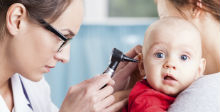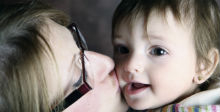Internal mini form
Contact Us Today
Oral health is an area that sometimes is treated as an afterthought in light of the other medical concerns that affect people with Cerebral Palsy. Poor dental health, however, can lead to a multitude of health issues that range from annoying to serious.
People with disabilities are also vulnerable to dental problems if they cannot take care of their own oral health every day. However, there are ways that children and adults can maintain their dental health, either through modified care methods, or by seeking assistance from an assistant.
Aspects of Cerebral Palsy make a child more susceptible to oral health conditions
Although Cerebral Palsy does not cause oral abnormalities, those with Cerebral Palsy have a greater tendency than the general population to have oral hygiene conditions. In particular, a child’s teeth may look crowded, vary in size and shape, and be misaligned (malocclusion), and the child may incur damage from grinding his or her teeth (bruxism).
Children with Cerebral Palsy are also prone to bacterial infections (periodontal disease), redness and swelling (gingivitis), and damage to the mouth due to trauma.
Some aspects of Cerebral Palsy make a child more susceptible to oral health conditions. A child who experiences frequent seizures, for example, is more prone to head and mouth trauma, grinding of the teeth, and biting of the lips or cheeks.
Children who aren’t able to control facial muscles have trouble swallowing (dysphagia) and chewing. This inability to coordinate facial muscles also makes it difficult to brush, rinse, floss, constrict drool, and clear food pouches after a meal.
Misalignment of the “bite” (upper and lower teeth), referred to as malocclusion, is commonly found in children with Cerebral Palsy. Frequently, the lower teeth rest outside the upper teeth, providing less protection for the jaw and tongue. Malocclusion can cause abnormal facial appearance, misalignment of teeth, breathing through the mouth, drooling, and difficulties in biting and chewing.
Those with Cerebral Palsy are prone to tooth decay
Bacterial plaque can form on teeth exposed to a considerable amount of acid, particularly in those who have gastroesophageal reflux; those who aspirate, vomit, or drool; and those with trouble swallowing and chewing. Medication is often sugary and attaches to tooth enamel. In addition, children with Cerebral Palsy may take longer than normal to consume a meal, causing food to stay in the mouth longer and thereby increasing the potential for cavities. Coughing, gagging, choking, and aspiration contribute to bacteria build-up. These circumstances, if not properly maintained or prevented, may lead to tooth decay.
These circumstances increase the opportunity for bacteria to colonize on teeth, placing the child at risk for tooth decay, dental caries and periodontal disease if not properly cared for or prevented. Dental caries require fillings. Periodontal disease can lead to loss of teeth. Tooth decay can be avoided with proper oral hygiene.
Some dental practitioners specialize in special needs
Parents or legal guardians may be reluctant to seek dental treatment if their child has problems in opening the mouth, swallowing, chewing, or biting. Their fears may be misplaced as there are a host of providers who specialize in special needs.
Some professionals that specialize in the particular difficulties mentioned above, include:
- Dentists provide cleanings, fillings, and limited surgical procedures, as well as fluoride and sealant treatments to protect the teeth.
- Orthodontists specialize in dental displacement and treatment of malocclusions, while periodontists treat bacterial plaque, gingivitis and infections.
- Cosmetic dentistry improves the appearance of a smile, and dietitians develop specialized diets that offer food alternatives, feeding instructions, and appropriate food textures.
- Speech and language pathologists help an individual develop facial muscle control and coordination, thereby improving the ability to swallow without choking, inhaling, and aspirating food and liquids.
Choosing professionals with experience and training in the treatment of children with special needs is recommended when seeking care. Oral care practitioners will likely consult with the child’s primary care physician to coordinate primary care treatment. Special care will be required for the use of any pharmaceuticals – those used during the procedure as well as those provided in case of emergency. Breathing difficulties, seizure status, acid reflux, and sedation constraints may affect the dental practitioner’s treatment protocol.
Safety is a primary concern of those with special needs training. Safety precautions require training in CPR, clearing breathing pathways, supporting involuntary body movements, controlling shakes and seizures, and reducing the risk of aspiration. The practitioner trained in special needs is prepared for contingencies.
Trained professionals accommodate treatment in the wheelchair or better understand how to transfer the patient to the dental chair while accounting for the individual’s physical requirements.
Trained individuals also provide a calm, relaxing and supportive atmosphere, allow extra time to explain procedures slowly, and provide repeated, simple instructions for short-term memory capacity. They monitor breathing, especially in those unable to communicate. For those with communication challenges, trained professionals seek ways in which the patient is able to communicate discomfort or concerns.
The focus of everyday care, as well as long-term care, will help optimize functionality and thwart bacterial build-up and infections. Those trained in special needs may have helpful information and education materials to assist caretakers with daily oral hygiene measures.
The child’s primary caretaker is responsible for daily oral hygiene
The child’s primary caretaker will be responsible for supervising daily oral hygiene. This includes brushing, flossing and rinsing regularly throughout the day, particularly after liquid, solid or medication intake. If rinsing with water is not an option, sweeping the mouth with a gauze-wrapped finger, or using a disposable applicator swab may be helpful. Caregivers should also schedule regular check-ups for dental cleanings, fluoride treatments and sealants.
The child’s registered dietician, dental practitioner, and speech and language pathologist may lend advice on how best to support the child’s oral functioning, food intake, and oral hygiene to maintain oral health.
Conditions related to oral health include:
- Bruxism
- Dental caries (cavities, tooth decay)
- Drooling (sialorrhea)
- Dysphagia
- Gingivitis
- Malocclusion
- Mouth trauma
- Periodontal disease
Budgeting may be required, especially for those without dental health insurance coverage. Most dental practitioners today have payment plan options and dental care packages.

Associative conditions
Cerebral Palsy affects muscle tone, gross and fine motor functions, balance, coordination, and posture. These conditions are mainly orthopedic in nature and are considered primary conditions of Cerebral Palsy. There are associative conditions, like seizures and intellectual impairment that are common in individuals with Cerebral Palsy. And, there are co-mitigating factors that co-exist with Cerebral Palsy, but are unrelated to it. Understanding conditions commonly associated with Cerebral Palsy will enhance your ability to manage your child’s unique health concerns.
Associative Conditions
Common associative conditions
Click on a condition listed below to learn more.








